Russia and Iran have launched a new payment system to replace SWIFT globally, aiming to strengthen their economic ties and enhance financial independence. This system links Iran’s Shetab with Russia’s Mir, enabling mutual access to banking services and cash withdrawals at ATMs. While this initiative offers a workaround for existing sanctions, it brings legal complexities that banks need to navigate carefully. As countries explore alternatives to the U. S. dollar and reassess their trading partners, this partnership could reshape global trade dynamics. For a deeper understanding of the implications and strategies behind this move, you’ll want to explore further. The creation of this payment system reflects a broader trend of countries seeking autonomy from Western financial systems and a desire to establish multi-currency trade frameworks. In this context, the significance of technology and innovation cannot be understated, as nations increasingly turn to digital currencies and blockchain solutions to facilitate transactions. Additionally, the tornado cash cofounder response highlights the ongoing discussions around decentralized finance and its potential to empower individuals and nations against economic pressures. As these developments unfold, the implications for international relations and global markets will become ever more pronounced.
Key Takeaways
- Iran's Shetab system is now integrated with Russia's Mir system, allowing Iranian cardholders to access Russian ATMs.
- The new payment system aims to enhance economic collaboration and bypass the U.S.-dominated SWIFT system.
- Compliance with international sanctions remains crucial for financial institutions participating in the new system.
- The partnership between Russia and Iran promotes financial independence and reduces reliance on the U.S. dollar.
- Initiatives like BRICS Pay exemplify the global movement towards de-dollarization and alternative payment systems.
New Payment System Launched

As Iran and Russia integrate their national payment systems, a new payment system has been launched, linking Iran's Shetab system with Russia's Mir system. This integration allows Iranian bank card holders to withdraw cash from Russian ATMs, marking a significant milestone. You'll find that several Iranian banks, including Refah and Saderat, are now connected to the Mir system, with Bank Saderat Iran and Russia's VTB Bank acting as agents. The first phase is just the beginning, as future phases will enable Russian card holders to access cash in Iran and Iranians to shop at Russian stores using point-of-sale devices. This development bypasses the dollar-based SWIFT system, positioning both countries for enhanced economic collaboration and potential regional influence. This move signifies the deepening economic ties between Iran and Russia against Western influence.
Legal Implications of New System
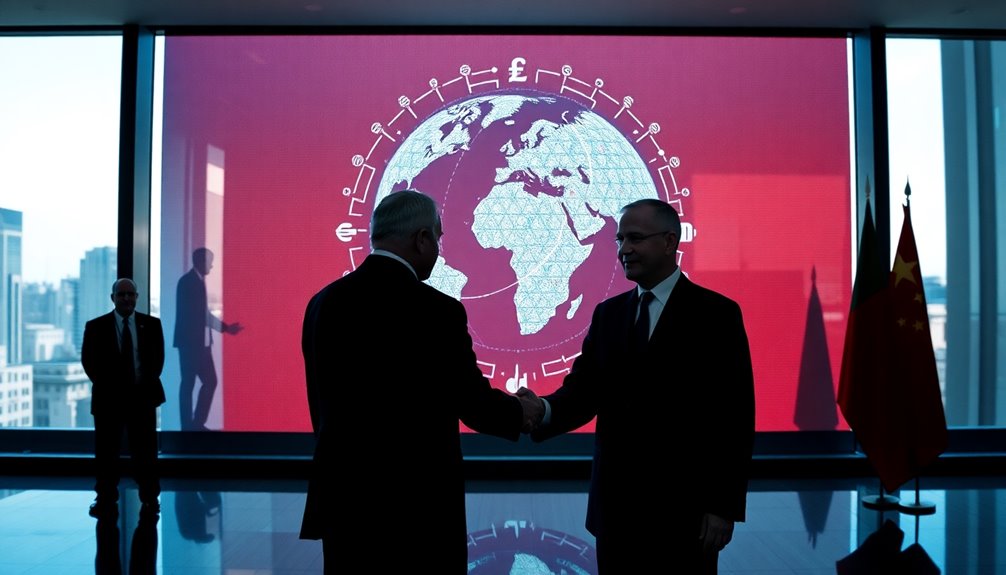
While the integration of Russia's Mir system with Iran's Shetab payment system offers a promising alternative to SWIFT, it also raises significant legal implications that must be carefully navigated.
First, compliance with international sanctions is crucial, as both U.S. and EU regulations restrict transactions with sanctioned Iranian and Russian banks. You'll need to ensure that your financial dealings don't inadvertently support sanctions evasion. Additionally, the responsibility for compliance falls on individual financial institutions, which must thoroughly screen transactions. Implementing this new system involves challenges, particularly regarding adherence to diverse regulatory frameworks. As Iranian bank cards are now accepted in Russia, regulators will closely monitor activity to prevent legal repercussions. Ultimately, the success of this initiative hinges on maintaining compliance within a complex legal landscape. Moreover, understanding the importance of credit scores can help institutions assess risk when engaging in international transactions.
Global Trade Shifts Analysis
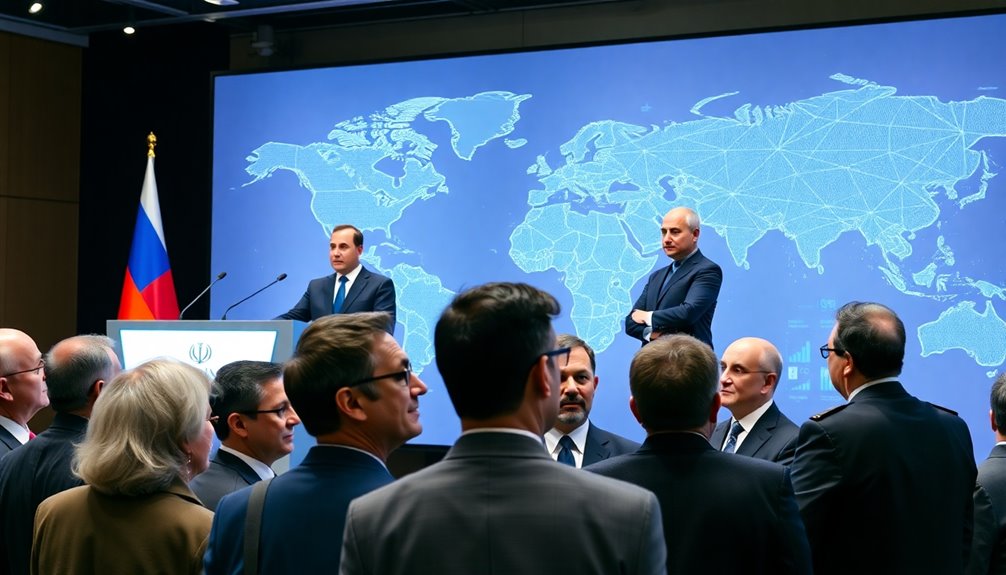
Given the shifting geopolitical landscape, global trade is undergoing significant transformations that impact how countries engage economically.
You're likely noticing that nations are reassessing their trading partners, prioritizing economic security. As foreign direct investment redirects along these geopolitical lines, the U.S. dollar's dominance remains, yet we see the yuan gaining traction, especially in China's trade relationships.
Initiatives like BRICS Pay aim to reduce reliance on the dollar, reflecting a broader trend of de-dollarization. The Russia-Iran partnership showcases a direct move to conduct business outside U.S. financial systems.
These shifts indicate a growing desire among countries to enhance financial independence, promoting alternative payment systems and regional trade initiatives that challenge traditional norms in global commerce. Additionally, the formation of BRICS payment systems aims to improve transaction efficiency among member nations, further supporting these economic changes.
Banking Sector Embraces Change
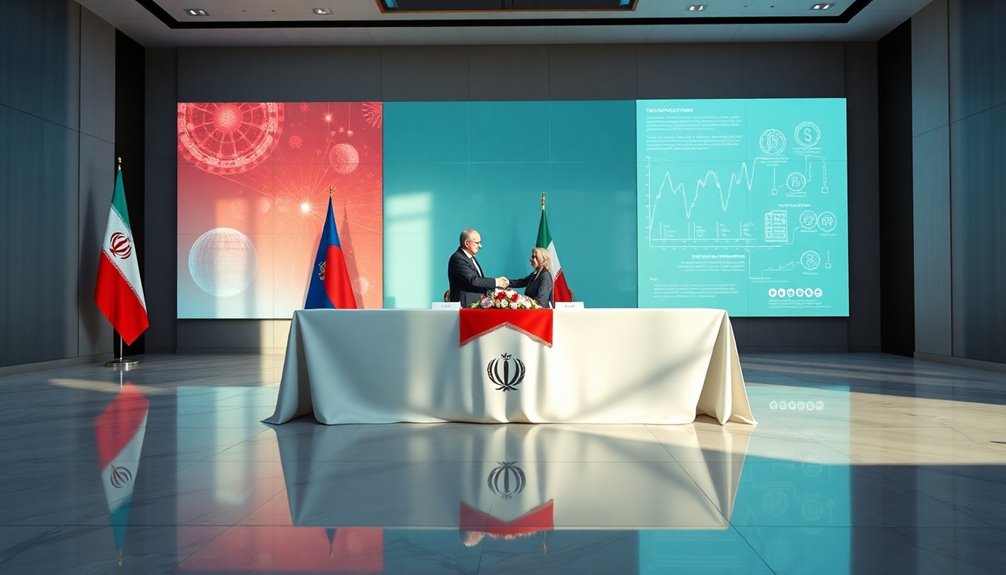
The banking sector is rapidly adapting to a landscape shaped by technological advancements and geopolitical shifts, which are compelling institutions to rethink their operations.
You've likely noticed the transition from SWIFT MT to the more advanced MX standards, enhancing data richness and operational efficiency. As banks migrate to ISO 20022, they're streamlining processes to better serve their customers. Enhanced data structure in MX allows for richer transaction details, thereby improving the overall transaction experience.
Solutions like SWIFT Xform are facilitating this shift by converting various payment types into standardized messages, ensuring seamless integration with existing systems.
Furthermore, alternative payment systems like Russia's SPFS and Iran's Shetab are enhancing global interoperability.
With these changes, the banking sector isn't just keeping pace but is actively embracing a transformative future in payments.
Geopolitical Tensions and Alliances
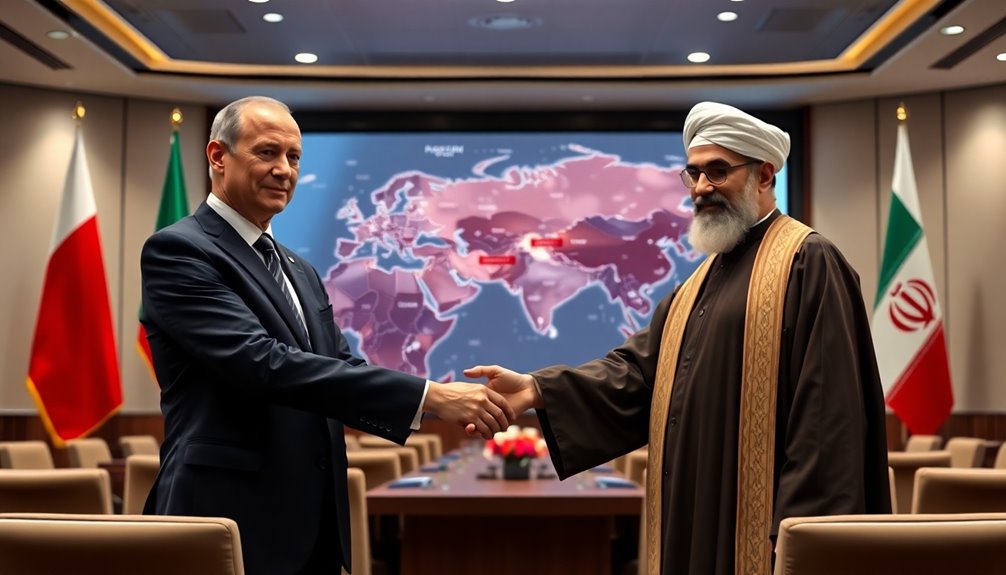
As geopolitical tensions rise, Russia and Iran find themselves navigating a complex web of alliances forged by shared adversities and common goals. Their histories are marked by mutual mistrust, yet they've united against common adversaries like the Ottoman and British Empires.
Currently, they stand together in conflicts in Ukraine and Syria, driven by grievances over U.S. sanctions. These sanctions have spurred economic solidarity, prompting both nations to develop alternative financial mechanisms and strategies for oil trade. The linkage between Iran's Shetab and Russia's Mir payment systems established in late 2024 exemplifies their commitment to circumventing Western financial networks.
Their increasing cooperation is evident through strategic partnerships, such as Iran's bid for the Shanghai Cooperation Organisation and BRICS membership. Together, they challenge the U.S.-led global order while seeking greater influence in a rapidly changing geopolitical landscape.
Emerging Markets Embrace Alternatives
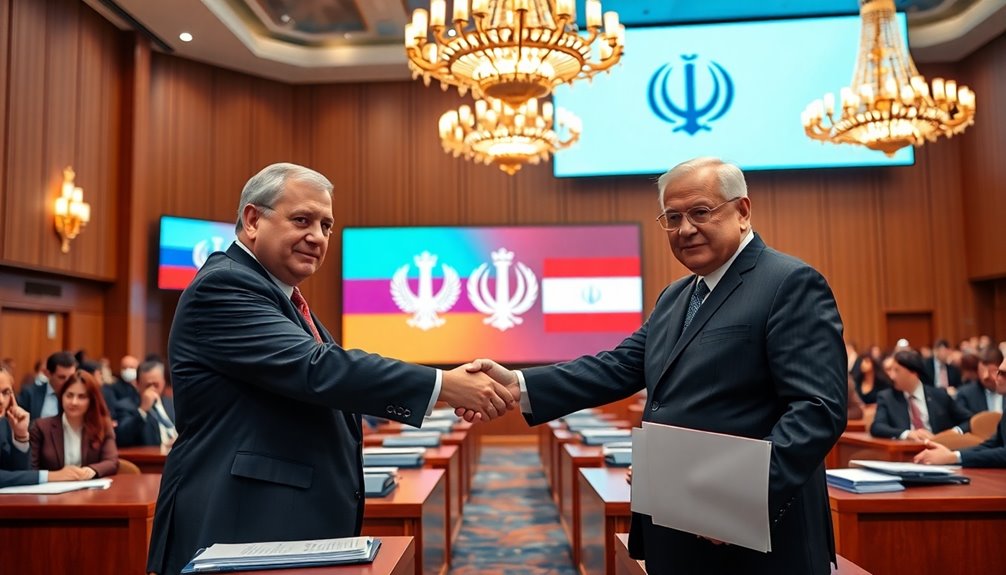
While traditional banking systems often leave many underserved, emerging markets are rapidly embracing alternative payment methods. You'll find mobile payments and e-wallets gaining traction, thanks to increased smartphone usage and internet access. In places like Africa and Southeast Asia, these tools help bridge the gap in banking services. Real-time transfers are also popular, speeding up transactions and boosting financial inclusion. Meanwhile, telecom companies are stepping in, offering mobile wallets that rival traditional banks. Countries like Russia and Iran are developing their own systems to reduce reliance on SWIFT, facilitating trade with national currencies. These initiatives reflect a shift towards innovative solutions that cater to the unique needs of underserved populations in emerging markets. This trend is further supported by the growth of e-commerce, driving demand for diverse payment options.
Frequently Asked Questions
How Will Consumers Be Affected by This New Payment System?
You'll likely notice several changes with this new payment system.
Transactions might slow down, leading to longer wait times for processing and potential extra costs. While security measures aim to protect your data, they could also complicate verification processes.
Access to services like ATMs may improve for cardholders, but delays could still occur.
What Currencies Will Be Supported in the New Payment System?
In the new payment system, you'll see support for several currencies.
Initially, you'll be able to use the Russian Ruble and the Iranian Rial. For tourists, local currencies will also be available at ATMs.
As the system expands, expect to withdraw Rubles in Iran and Rials in Russia.
Ultimately, you'll make purchases with your bank cards in both countries, enhancing your ability to transact seamlessly across borders.
Will This System Impact Existing International Sanctions?
Did you know that over 90% of global trade transactions still rely on the US dollar?
This new payment system could significantly impact existing international sanctions by providing alternative channels for transactions.
If countries adopt this system, they might bypass traditional sanctions, undermining their effectiveness.
As nations like Russia and Iran work together, the landscape of global finance could shift, making it harder for sanctions to achieve their intended goals.
How Do Businesses Transition to the New Payment System?
To transition to the new payment system, you'll need to prepare thoroughly.
Start by ensuring technical compatibility with your current banking setup and train your staff to minimize disruptions.
Assess any risks and ensure compliance with relevant regulations.
Integrate the new system with existing frameworks and consider a phased rollout to ease user adoption.
Lastly, monitor performance closely and gather feedback to make ongoing improvements and maintain operational efficiency.
What Are the Potential Risks of Using This New Payment System?
"Don't put all your eggs in one basket."
Using this new payment system comes with potential risks. You might face currency instability due to reliance on national currencies, and limited global acceptance could hinder international transactions.
Security concerns, like state control and hacking risks, may make you hesitant. Additionally, the system's integration costs and operational challenges could complicate matters further, ultimately affecting your confidence in financial stability and transaction reliability.
Conclusion
So, as Russia and Iran roll out their shiny new payment system, it's clear they're not just playing Monopoly; they're trying to flip the global economic board! Who needs SWIFT when you can have a 'swift' alternative that might just come with a side of geopolitical drama? While the banking sector jumps on this bandwagon, let's just hope they don't forget their helmets—because navigating these new financial waters could get bumpy, and we all love a good rollercoaster ride!









